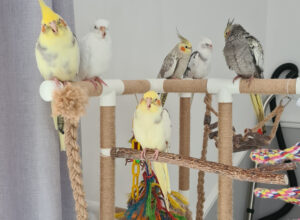the importance of veterinary care for cockatiels
Key Takeaways
- Understanding Cockatiels: Insight into the unique needs and characteristics of cockatiels.
- Veterinary Care: The critical role of regular vet visits in maintaining cockatiel health.
- Common Health Issues: Identification and management of common health problems in cockatiels.
- Nutrition and Diet: The importance of a balanced diet for cockatiel health.
- Preventive Measures: Tips for preventive care to ensure the well-being of your cockatiel.
As the pet of six cockatiels (yes it is that way around haha), I’ve come to understand the great pleasure these charming birds bring into our lives. Their playful antics, affectionate nature, and the ability to mimic sounds make them delightful companions. However, owning a cockatiel also comes with a significant responsibility. Top of the list of priorities is their health and well-being. In this article, I aim to educate on the importance of veterinary care for cockatiels, drawing from my personal experiences and extensive research.
Understanding Your Feathered Friend
Cockatiels, native to Australia, are small parrots known for their distinctive crests and varied color patterns. They can live up to 15-20 years with proper care, maybe more! Making them a long-term commitment for any pet owner. For more on their basic needs, see Essential Cockatiel Care.
Characteristics of Cockatiels:
- Social Nature: They thrive on interaction with their human companions or other birds. Learn more about their Social Needs.
- Intelligence: Cockatiels are smart and can learn tricks and mimic sounds. Learn more about the Basics of Cockatiel Communication.
- Sensitivity: They are sensitive to their environment and can get stressed easily. Understanding their Behaviour is key.
The Role of Veterinary Care
Regular veterinary check-ups are crucial for maintaining your cockatiel’s health. These visits help in early detection of potential health issues and provide an opportunity for professional advice on care and nutrition.
I once had a poorly cockatiel chick. Whilst taking it to the Vet, I took the opportunity to take the adults too for a check up. It’s always a good idea to find your local avian vet and register there before you need one. Sadly, avian specialist vets are few and far between. For example, I travel over an hour away to Anton Vets in Andover. However, it’s well worth the long journey. The team are fantastic!
Benefits of Regular Vet Visits:
- Early Detection of Diseases: Vets can spot signs of illness that are not obvious to owners. Learn about Identifying Cockatiel Illnesses.
- Dietary Advice: Professional guidance on nutrition tailored to your bird’s needs. See Cockatiel Feeding Basics.
- Behavioural Insights: Understanding and managing your cockatiel’s behaviour.
Common Health Issues in Cockatiels
Cockatiels, like all pets, are prone to certain health issues. Being aware of these can help in early intervention and treatment.
| Health Issue | Symptoms | Treatment |
|---|---|---|
| Respiratory Infections | Sneezing, nasal discharge | Antibiotics, improved air quality |
| Feather Plucking | Loss of feathers, skin irritation | Environmental enrichment, stress reduction |
| Beak and Feather Disease | Abnormal feather growth, beak deformities | Supportive care, quarantine infected birds |
Nutrition and Diet: A Cornerstone of Health
A balanced diet is essential for your cockatiel’s health. Seeds alone are not sufficient; a mix of fruits, vegetables, and specially formulated pellets is necessary. For more on diet, see Safe Fruits and Veggies for Cockatiels.
Ideal Diet Composition:
- Pellets: Should form about 60-70% of the diet.
- Vegetables and Fruits: 20-30%, ensuring variety.
- Seeds and Nuts: Only as occasional treats due to high fat content.
Preventive Measures for Cockatiel Health
Prevention is better than cure, especially when it comes to pet health. Here are some tips to keep your cockatiel healthy:
- Regular Exercise: Ensure your cockatiel has enough space to fly and exercise. Explore Cockatiel Exercise and Play.
- Mental Stimulation: Toys and interaction to keep them mentally engaged. Prevent Cockatiel Boredom.
- Clean Environment: Regular cleaning of the cage and accessories to prevent infections. Tips on Cage Cleaning.
Personal Insights and Experiences
As a cockatiel owner, I’ve learned the importance of observing my bird’s behaviour and health closely. Regular vet visits have been instrumental in addressing health issues promptly. I know it’s about dogs. However, here’s a quote that resonates with my experience:
“The bond with a true dog is as lasting as the ties of this earth will ever be.” – Konrad Lorenz
While Lorenz speaks of dogs, the sentiment holds true for cockatiels as well. The bond we form with our feathered friends is profound and caring for their health is a way to honour that bond.
Conclusion
Owning a cockatiel is a rewarding experience, filled with joy and companionship. However, it comes with the responsibility of ensuring their health and well-being. Regular veterinary care, a balanced diet, and preventive measures are key to a long, healthy life for your cockatiel. As owners, we must remember that our care and attention can make all the difference in their lives.
Remember, a healthy cockatiel is a happy cockatiel! For more on daily care, visit Daily Cockatiel Care.

